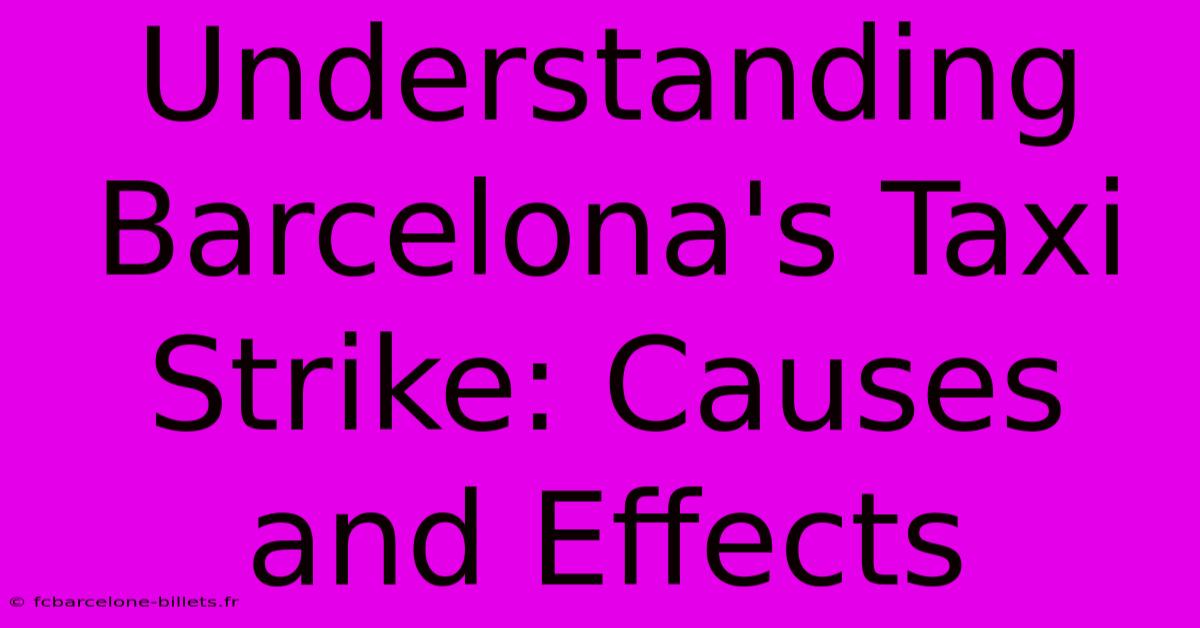Understanding Barcelona's Taxi Strike: Causes And Effects

Table of Contents
Understanding Barcelona's Taxi Strike: Causes and Effects
Barcelona, a city renowned for its vibrant culture and tourism, recently experienced a significant taxi strike. This event disrupted the city's transportation system, leaving both residents and visitors grappling with its consequences. Understanding the reasons behind the strike and its ripple effects is crucial to grasping the complexities of urban transportation and labor relations.
The Roots of the Unrest: Why Did Barcelona's Taxi Drivers Strike?
The Barcelona taxi strike wasn't a spontaneous outburst; it was the culmination of simmering discontent among taxi drivers, fueled by several key factors:
1. The Rise of Ride-Hailing Apps:
This is arguably the most significant cause. The proliferation of ride-hailing apps like Uber and Cabify presented a formidable challenge to traditional taxi services. Taxi drivers argued that these apps operated with fewer regulations and lower costs, creating unfair competition and impacting their livelihoods. They felt the authorities weren't doing enough to level the playing field.
2. Licensing and Regulation Issues:
The licensing process for taxis in Barcelona has historically been restrictive, limiting the number of licenses available. This scarcity, combined with the influx of ride-hailing services, exacerbated the competition and fueled feelings of unfairness among established taxi drivers. They felt the regulations favored newcomers and ignored their concerns.
3. Working Conditions and Income:
Taxi drivers highlighted concerns about their working conditions, including long hours, low income relative to expenses, and a lack of social security benefits in some instances. The increased competition only intensified these pre-existing issues, driving many to the breaking point.
4. Lack of Dialogue and Negotiation:
The taxi drivers felt their concerns were largely ignored by city authorities. A lack of meaningful dialogue and negotiation between the taxi unions and the local government contributed to the escalation of tensions, ultimately resulting in the strike. The feeling of being unheard fueled the drivers' determination to take direct action.
The Impact of the Strike: Disruption and Beyond
The Barcelona taxi strike had significant repercussions across the city:
1. Transportation Chaos:
The most immediate effect was widespread disruption to the city's transportation network. Tourists and residents alike faced difficulties in getting around, leading to delays and frustration. Public transport systems experienced increased pressure as people sought alternatives.
2. Economic Losses:
The strike led to significant economic losses, impacting various sectors. Businesses reliant on tourism suffered due to decreased visitor numbers and accessibility problems. The disruption also affected other transportation-related industries.
3. Public Opinion and Political Fallout:
The strike generated considerable public debate, highlighting the complexities of regulating the transportation industry in a rapidly evolving technological landscape. The city's government faced criticism for its handling of the situation, leading to political fallout and calls for reform.
Looking Ahead: Finding Solutions for Sustainable Transportation
The Barcelona taxi strike serves as a stark reminder of the need for effective dialogue and balanced regulation in the transportation sector. Addressing the concerns of taxi drivers while ensuring fair competition and a sustainable transportation system for everyone requires a multi-pronged approach:
- Modernizing regulations: A review of existing taxi regulations is necessary to ensure they reflect the current realities of the market and address the challenges posed by ride-hailing services.
- Supporting taxi drivers: Initiatives to improve the working conditions and income of taxi drivers, such as providing social security benefits and professional development opportunities, are essential.
- Promoting dialogue and collaboration: Open communication and collaborative efforts between taxi unions, ride-hailing companies, and the city government are crucial to finding lasting solutions.
The Barcelona taxi strike highlights the urgent need for a comprehensive strategy that balances the interests of traditional taxi services, ride-hailing apps, and the broader public. Only through such a strategy can Barcelona ensure a sustainable and efficient transportation system for the future.

Thank you for visiting our website wich cover about Understanding Barcelona's Taxi Strike: Causes And Effects. We hope the information provided has been useful to you. Feel free to contact us if you have any questions or need further assistance. See you next time and dont miss to bookmark.
Featured Posts
-
Barcelona Vs Alaves Who Will Come Out On Top
Apr 03, 2025
-
Laportes Impact On Barcelonas Club Culture
Apr 03, 2025
-
Hot Air Balloon Barcelona The City Of Wonders From Above
Apr 03, 2025
-
Best Bars In Barcelona Gothic Discover Hidden Patios
Apr 03, 2025
-
Luis Miguel Barcelona 2024 An Unforgettable Night
Apr 03, 2025
